Summer 2024 Fellows: Aditya Udaygiri, Sara Abdelhamid
Office Description
DIME is a Department of the World Bank’s Development Economics Vice Presidency. DIME’s purpose is to increase the use of impact evaluation (IE) in the design and implementation of public policy and to develop institutional capacity and motivation for evidence-based policy. DIME’s work focuses on three areas: Evaluating programs at scale to answer policy-relevant questions; Building capacity to strengthen country institutions for evidence-based policymaking; Building theory on mechanisms in strategic development areas based on high-quality evidence DIME aims to overcome the challenge of identifying true cause-and-effect relations in policy programs. By linking researchers to policymakers and feeding results back into policies, DIME fosters systematic use of evidence, which informs adoption, mid-course corrections, and scale-up of policies.
Through workshops and clinics with operational staff and government clients, joint research teams, active field coordination, as well as research products such as seminars, papers, and policy briefs, DIME builds capacity while forming a wider community of practice.
With a portfolio of more than 300 impact evaluations, DIME operates across all sectors in about 60 countries spanning the globe. The IEs test a variety of interventions and mechanisms to understand why policy succeeds or fails and how to improve policy design and implementation to obtain better results. By working proactively in collaboration with clients, DIME employs experimental methods to infer causality whenever possible (79% of the portfolio). 17% of DIME’s IEs utilize non-experimental methods, while 4% use a combination of the two. DIME adopts a programmatic approach to evidence-based policymaking to increase economies of scale in research and learning. It bridges the gap between research and practice by engaging government counterparts in every phase of the policy cycle and building their capacity to make systematic use of data and evidence.
Description of the Work
Duties include, but are not limited to:
- Clean administrative and primary datasets and create all indicators required for analysis.
- Write well-documented, reproducible code for data cleaning, descriptive statistics, regression analysis, data visualization, and any other analysis as per project needs; document all data work on the project’s GitHub repository.
- Manage databases, integrating various data sources (for example, project monitoring data, administrative data from local government, and household survey data). This may require programming matching algorithms, using spatial data to create linkages, performing manual matching, and linking up with field staff for additional information on specific tasks.
- Support primary data collection: participate in questionnaire design; program electronic questionnaires, design and run high frequency quality checks on raw data; liaise with field staff to resolve data issues and required clarifications.
- Conduct literature review and syntheses, contribute to impact evaluation reports and policy briefs, support the development of grant applications, and other writing and editing tasks.
- Prepare push-button replication files academic papers and related outputs.
- Deliver training courses on data processing and analysis for government counterparts.
Desired Skills
- Experience in the analysis of quantitative/qualitative data; Experience using Stata, R or Python;
- Keen interest in promoting reproducible and transparent research;
- Demonstrated interest in monitoring systems;
- Excellent organizational skills and attention to detail;
- Strong written and verbal communication skills in English required, fluency in other World Bank working languages preferred;
- Eagerness to collaborate with colleagues of diverse backgrounds, skills, and experience;
- Resourceful and a self-starter, excited to work on a dynamic and fast-growing team;
- Background in impact evaluation methods is an advantage
